Overview
To maintain accountability in weight loss, individuals must commit to tracking their food intake, exercise routines, and weight changes. This practice fosters a sense of responsibility that is crucial for achieving health goals. Furthermore, the article emphasizes that accountability—whether through personal contact or structured support systems—significantly enhances motivation and adherence to weight loss efforts. Studies have shown that those engaged in regular check-ins and accountability-focused programs experience better outcomes, reinforcing the value of such strategies.
Introduction
In the quest for effective weight loss, accountability emerges as a powerful ally, serving as the cornerstone of success for individuals striving to meet their health goals. By embracing personal responsibility—tracking food intake, adhering to exercise routines, and monitoring weight fluctuations—people can navigate the challenges of their weight loss journeys with greater resilience. Recent studies reveal that those engaged in accountability-focused programs not only experience improved outcomes but also develop a stronger commitment to their health objectives.
Furthermore, as organizations increasingly recognize the importance of fostering a culture of accountability, innovative approaches are being implemented to support employees in their wellness endeavors. This article delves into the multifaceted role of accountability in weight loss, exploring practical strategies, psychological foundations, and the impact of healthy eating and exercise on achieving lasting results.
Understanding Accountability in Weight Loss
Learning how to stay accountable for weight loss involves a commitment to wellness goals and actions, which includes the responsibility for tracking food intake, exercise routines, and weight fluctuations. This foundational concept is essential as it empowers individuals to understand their role in achieving health objectives. By accepting responsibility, individuals can effectively navigate challenges and maintain focus on their goals, which is crucial for understanding how to stay accountable for weight loss and making necessary adjustments along the way.
Recent studies underscore the significance of accountability in weight loss programs. For instance, research indicates that individuals who engage in personal-contact interventions experience a mean regain that is 1.2 kg less over 30 months compared to those relying solely on technology-based support. This highlights the effectiveness of personal engagement in fostering long-term success.
Future research should concentrate on improving both personal-contact and technology-based interventions for better long-term outcomes, ensuring that individuals have access to the most effective strategies for managing their bodies.
Caine Wilkes, an Olympian and experienced coach, stresses the significance of personal accountability in health objectives, stating, "Of the Americans with excess body mass who try to reduce their size, about 20% of them achieve success in maintaining their results over time." This statistic demonstrates the challenges many encounter, emphasizing the need for organized responsibility measures, particularly within corporate wellness programs that can offer the necessary support.
Furthermore, learning how to stay accountable for weight loss can greatly influence motivation and involvement in reduction efforts. Programs that incorporate regular check-ins and support systems have been shown to enhance adherence to wellness goals, particularly in learning how to stay accountable for weight loss, leading to improved outcomes. For instance, individuals who engage in accountability-focused coaching frequently mention greater levels of motivation and satisfaction, which are essential for learning how to stay accountable for weight loss.
Foresight Health Coaching's corporate partnerships exemplify how organizations can invest in their teams' health by fostering accountability. For instance, a client company reported that employees who participated in our coaching program lost an average of 10% of their body mass over six months, demonstrating the tangible benefits of our approach. By integrating personal coaching sessions and structured support, companies can create an environment where employees feel encouraged to share their progress and setbacks.
Testimonials from clients such as Sarah, who remarked, "The coaching I received transformed my approach to health—I've lost pounds and gained confidence," highlight the positive impact of our services. This interaction not only promotes a sense of community but also strengthens personal dedication to wellness goals.
In summary, understanding how to stay accountable for weight loss significantly impacts success rates in shedding pounds. By assuming responsibility for their health journeys and understanding how to stay accountable for weight loss, individuals can foster resilience and adaptability, ultimately resulting in more effective and enduring results. Organizations that prioritize accountability through wellness initiatives can enhance their employees' overall well-being and productivity.
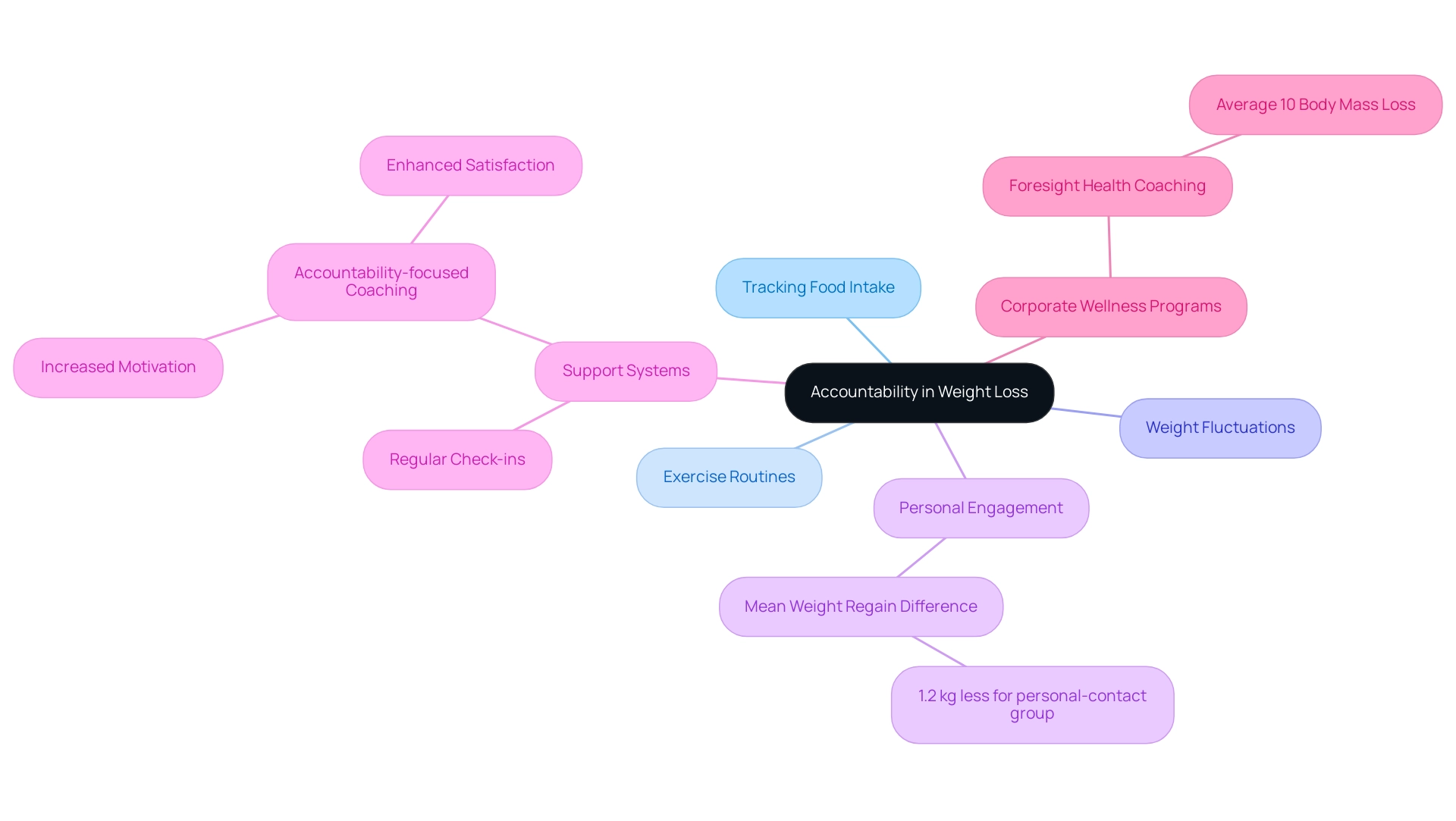
Finding Your Inner Drive: The Psychological Foundation for Weight Loss
Uncovering your inner motivation is essential for effective weight loss, and Foresight Health Coaching is here to assist you at every stage. Begin by identifying the personal motivations that inspire you to shed pounds—these could range from health concerns and self-image to the desire for increased activity levels. Take time to reflect on your reasons for wanting to reduce your body mass and document them.
This exercise not only clarifies your objectives but also shows you how to stay accountable for weight loss, solidifying your commitment to achieving them.
Research indicates that intrinsic motivation—such as the desire to feel healthier or enhance your quality of life—often proves to be more effective and sustainable than external pressures, like societal expectations or peer influence. A retrospective cohort study named 'Determinants of Weight Reduction in Adults' examined elements affecting weight reduction in 318 overweight and obese patients. The research discovered that individuals who interacted more often with support networks and kept shorter gaps between consultations were more likely to achieve substantial reductions in body mass.
This emphasizes the significance of consistent involvement in your weight loss journey, a principle that Foresight Health Coaching represents through its customized coaching programs and app-based delivery.
As Dr. Natasha Schvey, an assistant professor of medical and clinical psychology, notes, 'Obesity is the largest medical disqualifier for individuals interested in military service,' emphasizing the significant influence of body mass on personal and professional aspirations. This is particularly relevant in high-stress environments, as evidenced by the U.S. Naval Hospital Guam assisting 246 active duty service members facing mental wellness emergencies, which highlights the necessity for comprehensive care and wellness strategies.
Foresight Health Coaching provides collaborations that can assist employees in their wellness journeys, promoting a healthier, more unified team culture.
Our corporate memberships include features such as in-person wellness talks and comprehensive nutrition services, designed to optimize workplace eating habits and promote overall well-being. By concentrating on intrinsic motivations and creating a clear, personal rationale for your weight loss objectives, you can discover how to stay accountable for weight loss, fostering a more resilient and lasting commitment to your wellness journey. With Foresight's comprehensive wellness coaching services, including personalized fitness coaching and wellness workshops, you have the tools and support needed to succeed.
Testimonials from our clients highlight transformative experiences, showcasing how our programs have led to lasting lifestyle changes. For detailed information on our packages and to discuss how we can support your health goals, please contact us directly. Let’s work together to craft a wellness plan that truly suits your needs.
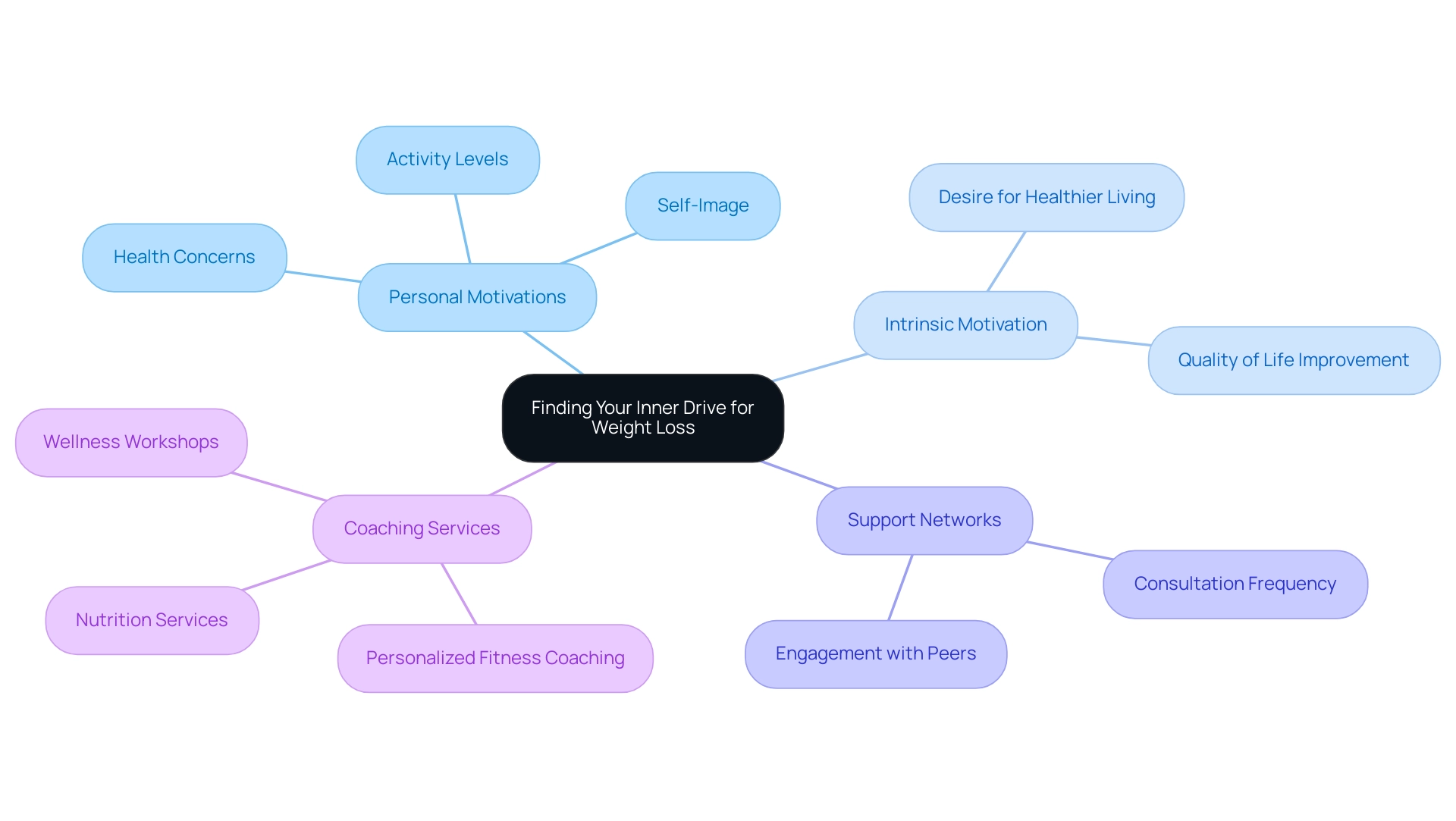
Setting Achievable Goals: A Roadmap to Success
To set attainable targets for reducing body mass, begin by employing the SMART criteria—Specific, Measurable, Achievable, Relevant, and Time-bound. Instead of simply stating, 'I want to lose pounds,' articulate a clear objective: 'I will lose 10 pounds in three months by exercising three times a week and meticulously tracking my food intake.' This specificity not only clarifies your target but also enhances your commitment. Breaking larger goals into smaller, manageable tasks is essential to prevent feelings of overwhelm.
Studies suggest that individuals who utilize future tense language when establishing objectives often achieve better results in reducing mass. In fact, research has indicated that future tense words correlate with greater reductions, reinforcing the notion that framing your objectives in a forward-looking manner can significantly influence your success.
Regularly reviewing and adjusting your goals based on your progress is crucial. This practice ensures that your targets remain realistic and motivating, adapting to any changes in your circumstances or performance. Celebrating small victories along the way can further bolster your motivation, reinforcing your dedication to the weight loss journey.
With the support of a comprehensive wellness coaching app, users can receive personalized workouts, guided nutrition, and mindset strategies tailored to their needs. This app not only provides daily programming to assist users in staying organized but also includes community support and direct messaging with coaches to help users learn how to stay accountable for weight loss. Notably, the app features a 350+ movement catalog, bi-weekly group calls for enhanced support, and an accountability and data hub to track your progress effectively.
Recent studies have shown that behavioral interventions, such as setting SMART goals and utilizing tools like pedometers, can lead to improved health outcomes, particularly in older adults with chronic conditions. A notable case study titled 'Language and Weight Loss Outcomes' demonstrated that the language used during goal-setting in a mobile management program significantly influenced participants' outcomes. In particular, indicators of distanced language were linked to improved reduction outcomes, whereas immediate language was associated with increased dropout rates. This underscores the significance of careful communication in goal-setting. Furthermore, a one-percent rise in articles was linked to a .86 times decrease in the likelihood of attrition, highlighting the essential role of effective goal-setting strategies in sustaining motivation and responsibility.
By utilizing aspects such as community involvement, additional guidance, and access to expert recommendations in a user-friendly wellness application, individuals can discover how to stay accountable for weight loss while improving their responsibility and efficiency in reaching their goals for reducing body mass.
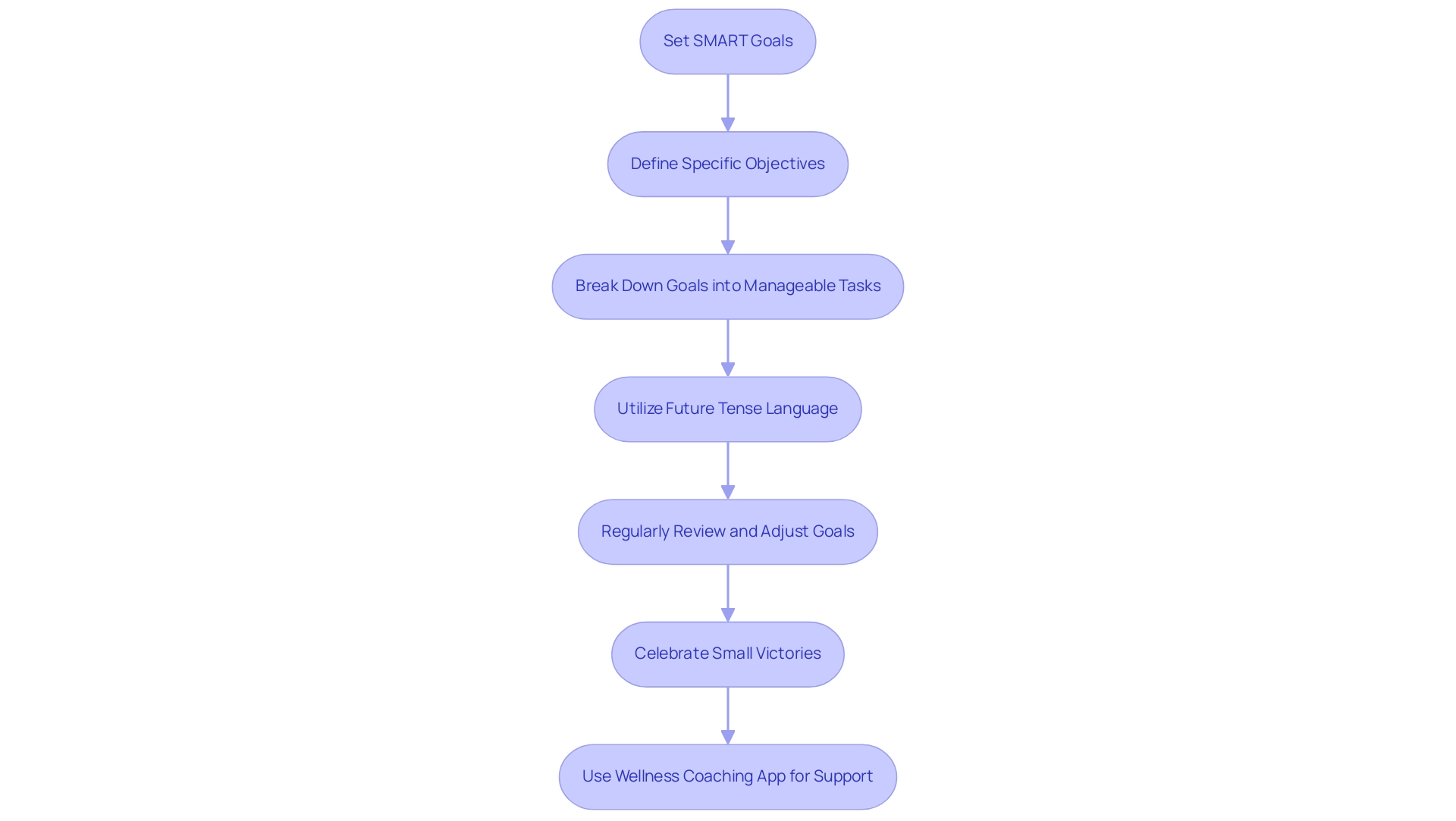
Embracing Healthy Eating: Fueling Your Weight Loss Journey
Healthy eating is a cornerstone of successful weight loss and responsibility. Foresight Health Coaching is dedicated to fostering this relationship with food through comprehensive health coaching services. To promote a positive approach, clients are encouraged to incorporate a diverse array of whole foods, including:
- Fruits
- Vegetables
- Whole grains
- Lean proteins
- Healthy fats
Preparing meals ahead of time is essential; it not only assists in maintaining responsibility but also teaches individuals how to stay accountable for weight loss by recognizing patterns in their eating habits.
Keeping a food diary can be particularly effective in tracking intake and making necessary adjustments.
Statistics reveal that only 12.2% of adults meet daily fruit intake recommendations, while a mere 9.3% achieve the vegetable intake goals. This highlights the pressing need for increased awareness and action towards healthier eating habits. Notably, 50% of Gen Zs are motivated to diet by improving their physical appearance, underscoring the importance of accountability in dietary choices, as noted by Kevin G. Volpp, M.D., Ph.D., FAHA, director of the Center for Health Incentives and Behavioral Economics.
Moderation is essential; allowing yourself occasional treats can prevent feelings of deprivation and promote a healthier mindset towards food. By savoring healthy foods and engaging in mindful eating, individuals can foster a positive connection with food while effectively striving towards their goals of reducing body mass.
Real-world instances show that meal planning can result in significant reductions in body mass. Individuals who engage in structured meal planning often report improved adherence to healthy eating patterns, which is vital given the alarming statistics surrounding unhealthy eating and physical inactivity—factors contributing to approximately 678,000 deaths annually in the U.S. due to nutrition-related diseases. The case study titled "Impact of Unhealthy Eating and Physical Inactivity" highlights the critical need for interventions targeting diet and physical activity to reduce the incidence of diseases such as heart disease, cancer, and type 2 diabetes.
Incorporating these healthy eating tips into your routine can teach you how to stay accountable for weight loss and support your weight loss journey, ultimately leading to a healthier lifestyle. Moreover, Foresight Health Coaching's corporate wellness programs are created to incorporate these strategies, promoting a culture of well-being and productivity within organizations. Our corporate memberships accommodate up to 30 employees and feature services such as:
- In-person wellness talks
- Comprehensive pantry and nutrition services
- Access to our wellness app, which enhances connectivity and support among employees
By utilizing these resources, organizations can create a supportive environment that promotes healthier eating habits and overall wellness.

Getting Active: The Role of Exercise in Staying Accountable
Exercise is a fundamental aspect of understanding how to stay accountable for weight loss, serving not only to burn calories but also to cultivate a sense of dedication to your health objectives. The current guidelines recommend engaging in at least 150 minutes of moderate-intensity aerobic activity each week, complemented by strength training exercises on two or more days. This balanced method not only assists in slimming down but also improves overall fitness and wellness.
However, it's important to note that only 30% of patients are counseled about exercise during appointments with their primary care physician, highlighting a significant gap in support for individuals on their fitness journeys. Many individuals, particularly those with diabetes, struggle to engage in regular physical activity, as illustrated in the case study titled 'Challenges in Promoting Physical Activity.' This study reveals that a significant percentage of individuals report no physical activity, emphasizing the need for effective strategies to promote exercise beyond just weight loss.
To make exercise a more enjoyable and sustainable part of your routine, it’s essential to find activities that resonate with you personally. Whether it’s dancing, cycling, or hiking, choosing enjoyable workouts transforms exercise from a chore into a rewarding experience. Participating in group fitness classes or teaming up with a workout buddy can significantly boost motivation and help you learn how to stay accountable for weight loss, creating a supportive environment that encourages consistency.
At Foresight Health Coaching, we acknowledge these needs and offer customized corporate wellness programs that improve employee well-being and productivity through personalized support and exercise. Our experienced coaches use evidence-based techniques to help employees develop lasting lifestyle changes, ensuring they take control of their health and well-being. Testimonials from our clients emphasize the beneficial effect of our programs: "Since starting with Foresight, I've not only shed pounds but also feel more energized and engaged at work!"
Tracking your workouts is another effective strategy for understanding how to stay accountable for weight loss. By recording your physical activities, you can see your advancement over time, which strengthens your dedication to your fitness journey. This practice not only highlights your achievements but also helps identify areas for improvement.
Incorporating these strategies can demonstrate how to stay accountable for weight loss through a more engaged and motivated approach. As Caine Wilkes, a specialist in nutrition and fitness, observes, 'Of the Americans with excess pounds who try to shed them, approximately 20% of them succeed in maintaining their results over time.' This statistic underscores how to stay accountable for weight loss and the importance of support in achieving lasting results.
Additionally, with around 6% of Americans currently using weight loss drugs like Ozempic or Wegovy, it is crucial to recognize exercise as a complementary approach to these strategies.
By nurturing a culture of well-being and unity within teams, organizations can enhance their employees' commitment to fitness, ultimately leading to improved outcomes and workplace productivity. Foresight Health Coaching's partnership provides organizations with an opportunity to play a crucial role in this endeavor, contributing to reduced absenteeism and lower healthcare costs while empowering employees to achieve their health goals.
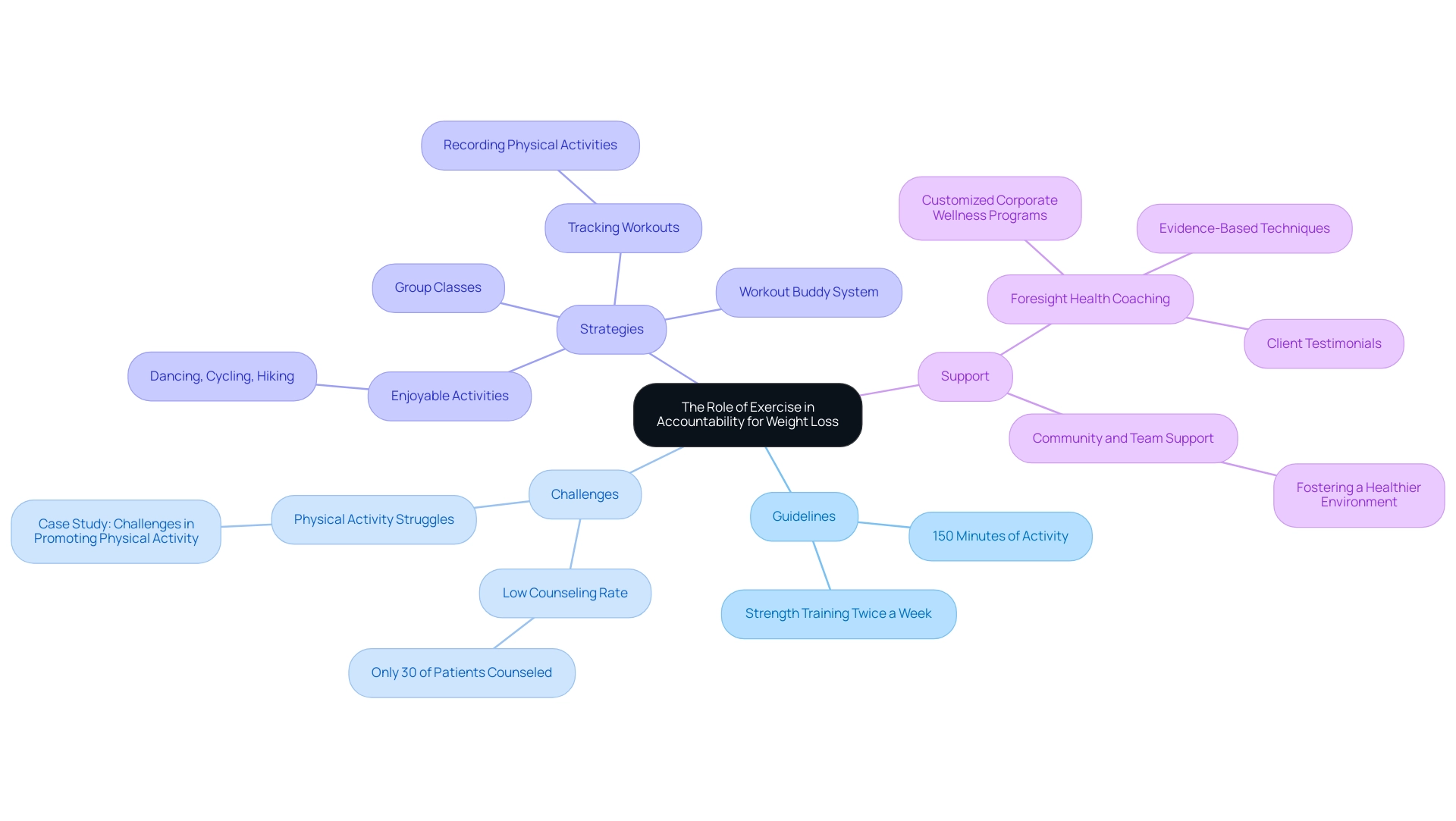
Changing Your Mindset: Cultivating a Positive Approach to Weight Loss
Fostering a positive attitude is essential for attaining enduring success in shedding pounds. Emphasizing progress over perfection can significantly impact your journey. Practicing self-compassion during setbacks is crucial; instead of viewing a misstep as failure, reframe it as a learning opportunity.
For instance, replace the thought 'I failed' with 'I learned something valuable.' This shift in perspective can cultivate resilience and encourage continued effort, particularly when considering how to stay accountable for weight loss by surrounding yourself with supportive individuals, which is another key strategy. Our comprehensive wellness coaching app centralizes all the tools and resources you need, offering community support that encourages your goals and teaches you how to stay accountable for weight loss, enhancing both accountability and motivation.
Engaging with others on similar journeys can provide the encouragement necessary to understand how to stay accountable for weight loss. Consistently reminding yourself of the reasons behind your journey—whether it's improving health, boosting confidence, or enhancing overall well-being—can help maintain a positive outlook.
The daily programming feature ensures that you stay on track with your goals and commitments. You can easily access your personalized workouts, lessons, and nutrition guidance whenever and wherever you are, making it convenient to follow your plan. Recent studies highlight the significant role of self-compassion in managing body mass.
Research indicates that self-reassurance has a total effect of 0.46 on well-being, suggesting that fostering self-compassion can lead to improved weight-related affect and overall satisfaction. As Cristiana Duarte, a researcher in the field, notes, 'Facilitating, supporting, and developing self-reassuring competencies in management programs may enhance related affect and well-being.' Furthermore, the influence of mentality on success rates in shedding pounds cannot be emphasized enough.
Individuals who adopt a positive mindset are more likely to experience favorable outcomes. For example, a longitudinal pilot study on the Iterative Mindset Method showed that participants not only developed healthier habits but also attained an average reduction of 2.76% over 60 days. This underscores the effectiveness of mindset training in facilitating behavior change.
It is important to note that the study had limitations, including its cross-sectional design and the under-representation of male participants, which may affect the generalizability of the findings. In summary, cultivating a positive mindset involves practical strategies such as reframing negative thoughts, surrounding yourself with supportive individuals, and maintaining a clear focus on your motivations. By combining these methods and using our wellness app's tailored workouts, nutrition advice, and daily planning, you can improve your fitness journey and attain lasting success. Sign Up Today!
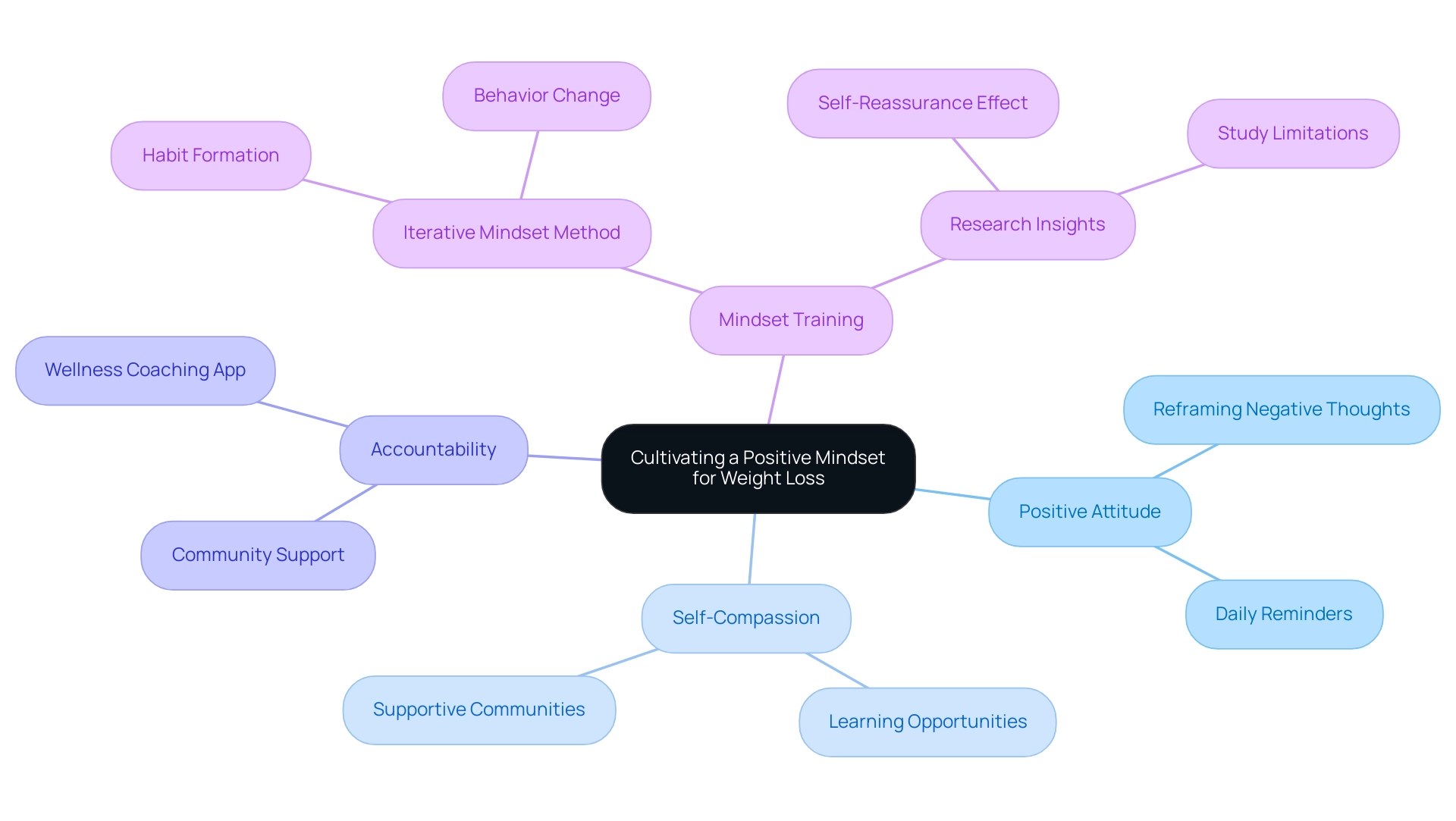
Practical Strategies for Maintaining Accountability in Your Weight Loss Journey
To efficiently uphold responsibility in your health improvement journey, consider incorporating the following strategies, bolstered by Foresight Health Coaching's extensive services:
- Keep a Food and Exercise Journal: Documenting your daily habits provides valuable insights into your eating patterns and activity levels. Research indicates that individuals who maintain food and exercise journals are more likely to achieve their weight loss goals, as this practice fosters self-awareness and encourages mindful eating. Foresight's app-based coaching supports this by allowing you to log meals, track your progress seamlessly, and receive feedback from your coach.
- Set Regular Check-Ins: Establish consistent meetings with a support partner or group to discuss your progress and any challenges you face. Studies show that having a partner for accountability can significantly improve motivation and dedication, resulting in better outcomes in managing body composition. This aligns with Foresight Health Coaching's emphasis on fostering a supportive team culture through in-person wellness talks and seminars, which are crucial for success.
- Utilize Technology: Leverage fitness apps and wearable devices to monitor your activity and food intake. Current trends in fitness technology have made it easier than ever to track your progress, with many apps, including Foresight's, offering features that allow you to set goals, log meals, analyze your performance over time, and connect with a community of users for support. Foresight Health Coaching's programs aim to enhance physical fitness and cognitive function, further bolstering your accountability efforts.
- Reward Yourself: Celebrate your achievements by rewarding yourself for reaching milestones, but opt for non-food-related rewards. This could include a new workout outfit, a massage, or a day out doing something you love. Positive reinforcement can boost motivation and reinforce healthy behaviors, aligning with Foresight's holistic approach to wellness, which includes nutritional guidance tailored to your needs.
- Stay Flexible: If a particular strategy isn’t yielding the desired results, be open to adjusting your plan. Flexibility is key to long-term success, as it allows you to adapt to changing circumstances and maintain your commitment to your goals. Foresight's customized coaching sessions are designed to adapt to personal requirements, ensuring that you remain focused.
By incorporating these strategies into your schedule, supported by Foresight's personalized coaching programs, you can strengthen your dedication to fitness goals and establish a lasting route to achievement. As Dr. Pagliara notes, 'accountability is a crucial element in achieving lasting weight loss,' underscoring the importance of these practices for anyone looking to improve their health and well-being. Furthermore, engaging in regular physical activity not only aids in weight management but also enhances metabolic function and reduces cardiovascular risk, highlighting the multifaceted benefits of a healthy lifestyle.
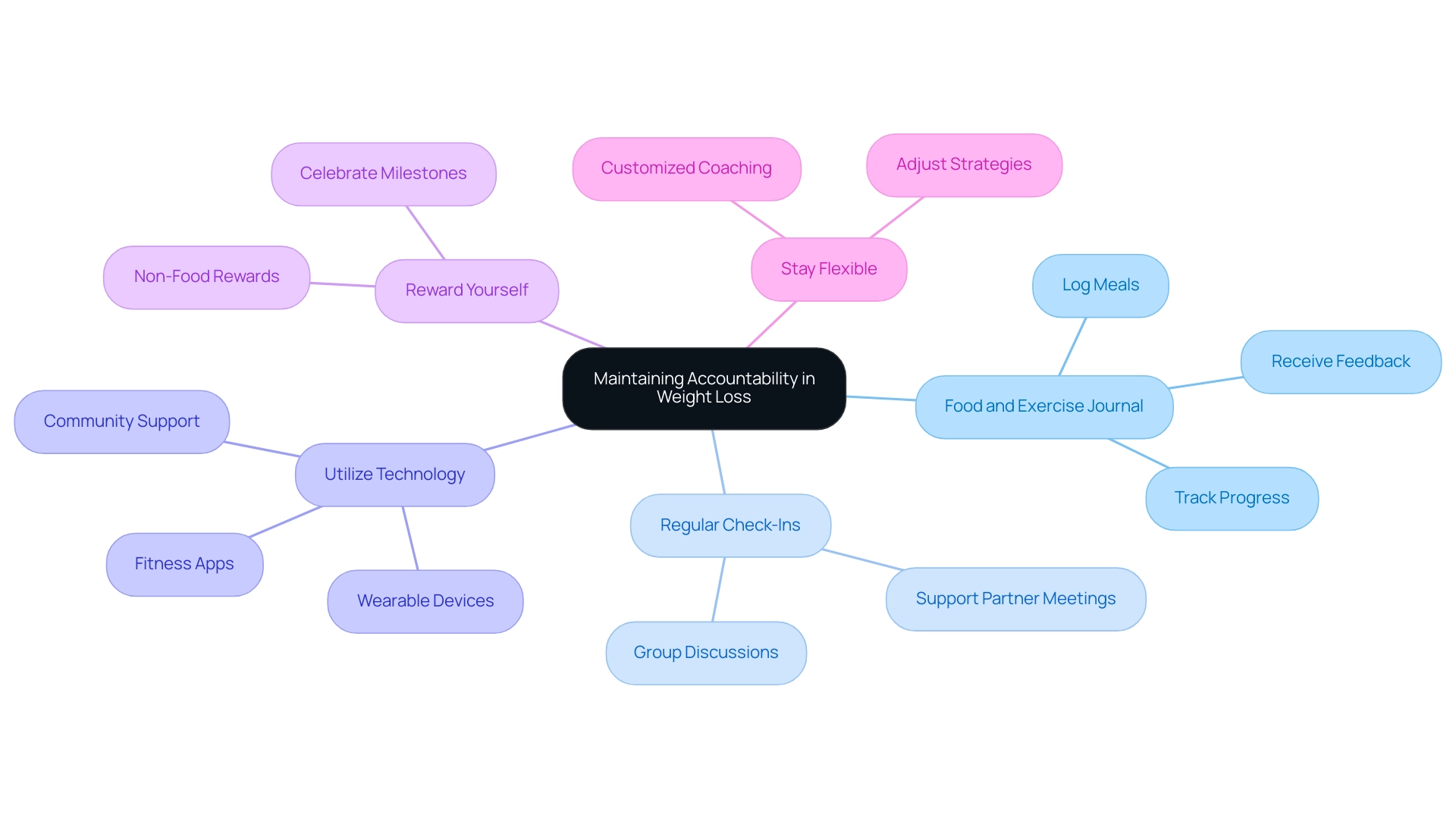
Conclusion
Accountability plays a pivotal role in successful weight loss, serving as the foundation upon which individuals can build their health goals. By embracing personal responsibility through tracking food intake, exercise, and weight fluctuations, individuals can enhance their resilience and adaptability in the face of challenges. Research consistently shows that those who engage in accountability-focused programs not only achieve better outcomes but also cultivate a deeper commitment to their health objectives.
Incorporating practical strategies such as keeping journals, setting regular check-ins, and utilizing technology can significantly bolster accountability. These approaches not only provide valuable insights into personal habits but also foster a supportive environment that encourages consistency and motivation. Furthermore, organizations that prioritize accountability through wellness initiatives can enhance employee well-being, ultimately leading to increased productivity and a healthier workplace culture.
The journey towards effective weight loss is multifaceted, involving healthy eating, regular exercise, and a positive mindset. By focusing on intrinsic motivations and setting achievable goals, individuals can create a sustainable path to success. Ultimately, the integration of accountability into everyday practices is essential for achieving lasting weight loss and improving overall health. With the right strategies and support, anyone can transform their weight loss journey into a fulfilling and successful experience.




